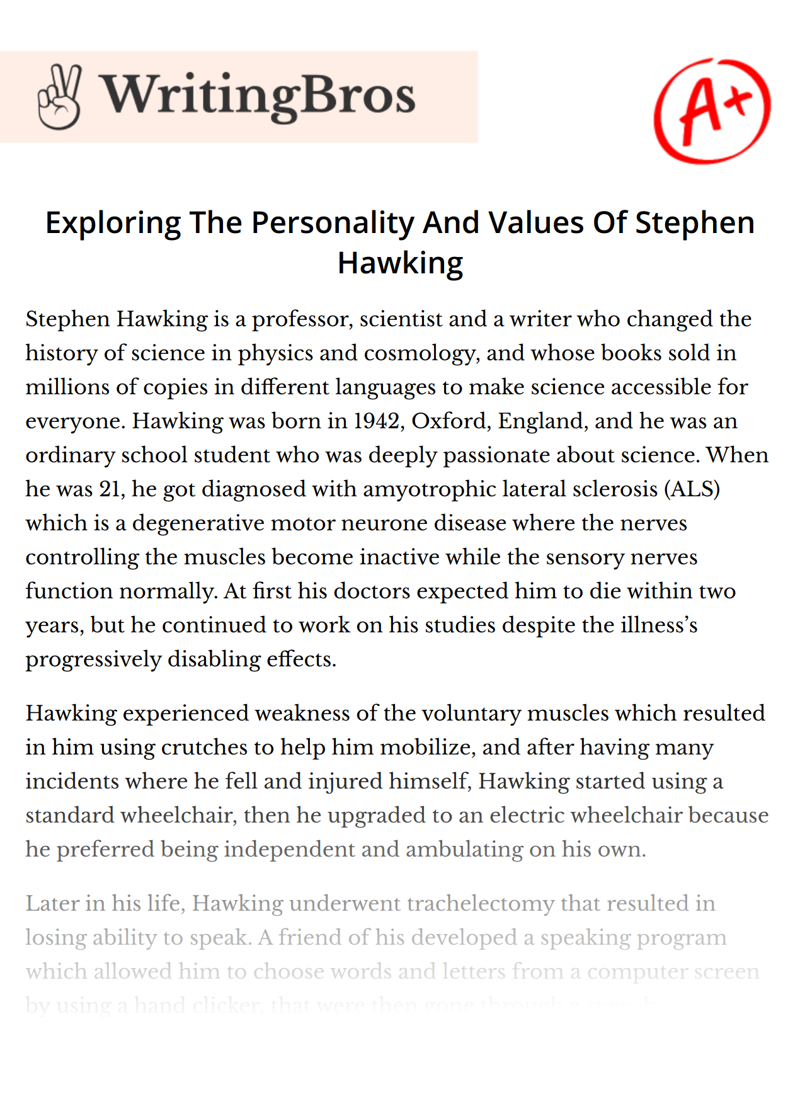Exploring The Personality And Values Of Stephen Hawking

Stephen Hawking is a professor, scientist and a writer who changed the history of science in physics and cosmology, and whose books sold in millions of copies in different languages to make science accessible for everyone. Hawking was born in 1942, Oxford, England, and he was an ordinary school student who was deeply passionate about science. When he was 21, he got diagnosed with amyotrophic lateral sclerosis (ALS) which is a degenerative motor neurone disease where the nerves controlling the muscles become inactive while the sensory nerves function normally. At first his doctors expected him to die within two years, but he continued to work on his studies despite the illness’s progressively disabling effects.
Hawking experienced weakness of the voluntary muscles which resulted in him using crutches to help him mobilize, and after having many incidents where he fell and injured himself, Hawking started using a standard wheelchair, then he upgraded to an electric wheelchair because he preferred being independent and ambulating on his own.
Later in his life, Hawking underwent trachelectomy that resulted in losing ability to speak. A friend of his developed a speaking program which allowed him to choose words and letters from a computer screen by using a hand clicker, that were then gone through a speech synthesizer. Eventually, Hawking lost control in his hand, but the developer came up with a cheek muscle sensor that helped him direct the program.
Jane Hawking was Stephen’s first wife and caregiver since his diagnoses, she carried his three children and was the biggest supporter of his even after they divorced in 1990. Later he was married to Elaine Mason who was his nurse and caregiver. She supported him for 11 years until they too got divorced.
With the help of his partners and caregivers, and with believing in himself despite his disability, Hawking was able to teach at Cambridge, and in 1979 he was appointed to Cambridge’s Lucasian professorship of mathematics. He also contributed to more than 15 books, the best seller of them is A Brief History of Time. Hawking received 13 honorary degrees, and he was awarded CBE in (1982), Companion of Honour (1989) and the Presidential Medal of Freedom (2009). He even made major appearances in TV shows such as The Big Bang Theory, The Simpsons, and Red Dwarf, and the 2014 movie The Theory of Everything which was a drama about Hawking’s life and work.
The occupational therapy role in Stephen Hawking case was mainly with the assistive technology which helped him compensate for mobility and speech difficulties. He used a thumb switch and a blink-switch attached to his glasses to control his computer. By squeezing his cheek muscles and 'blinking' an infra-red switch was activated and he was able to scan and select characters on the screen in order to compose speeches, surf the Internet, send e-mail and 'speak' through a voice synthesizer.
Personally, I have known about the scientist first through the movie that represented his life, and after that I started following his achievements and I read his book A brief history of time. For me, Stephen Hawking resembles a good example of an intelligent man who did not accept being identified by his disability. His condition did not stop him from becoming a remarkable scientist who contributed greatly to the scientific world. Observing the reality of a genius man such as Stephen hawking who suffered from a terrible illness and was told at the age of 21 that he will not be living more than 2 years yet surviving 50 more with huge achievements and accomplishments can encourage people with similar conditions to strive to live a happy and hopeful life that is full of success and prosperity.
Cite this Essay
To export a reference to this article please select a referencing style below

